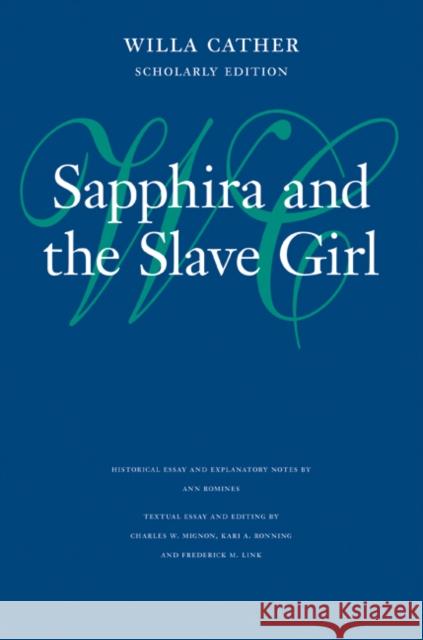Sapphira and the Slave Girl » książka
Sapphira and the Slave Girl
ISBN-13: 9780803214354 / Angielski / Twarda / 2009 / 774 str.
Willa Cather's twelfth and final novel, Sapphira and the Slave Girl, is her most intense fictional engagement with political and personal conflict. Set in Cather's Virginia birthplace in 1856, the novel draws on family and local history and the escalating conflicts of the last years of slavery-conflicts in which Cather's family members were deeply involved, both as slave owners and as opponents of slavery. Cather, at five years old, appears as a character in an unprecedented first-person epilogue. Tapping her earliest memories, Cather powerfully and sparely renders a Virginia world that is simultaneously beautiful and, as she said, "terrible." The historical essay and explanatory notes explore the novel's grounding in family, local, and national history; show how southern cultures continually shaped Cather's life and work, culminating with this novel; and trace the progress of Cather's research and composition during years of grief and loss that she described as the worst of her life. More early drafts, including manuscript fragments, are available for Sapphira and the Slave Girl than for any other Cather novel, and the revealing textual essay draws on this rich resource to provide new insights into Cather's composition process. Ann Romines, a professor of English at the George Washington University, is a well-known Cather scholar. She is the author and editor of several books, including Willa Cather's Southern Connections: New Essays on Cather and the South. Charles W. Mignon and Frederick M. Link are both professors emeritus of English at the University of Nebraska-Lincoln and textual editors of the Willa Cather Scholarly Edition series. Kari A. Ronning is a research associate professor of English, assistant editor of the Willa Cather Scholarly Edition series, and codirector of the Willa Cather Journalism project at the University of Nebraska-Lincoln.











